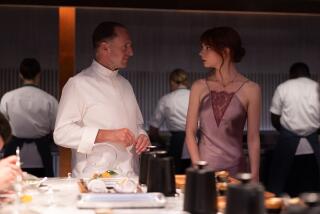No Substitutions: What’s on the Menu Is What You Get
- Share via
Frustration over inflexible restaurant menus is not an uncommon phenomenon.
Several readers write of experiences similar to that of Brant de Pierre, who wrote recently of being unable to get white toast with the Late Riser special at his golf club cafe.
Lee Healy of Newport Beach suggests a reason why the cafe insisted on serving a roll, rather than toast. “Rolls are an item that are traditionally served at dinner, and I would bet that they are left over from the night before. So the manager gets rid of them on a special priced ‘loss leader’ item. The white toast is used for those who are not ordering the special and are paying more for breakfast, which is the highest profit meal of the day for the restaurateur.”
Barry Jensen of Porterville recalls an experience he had in a restaurant at the National Airport in Washington, D.C. Jensen ordered the No. 2 special “without coffee.” The waitress served the meal, without coffee, and left the check. When he looked at the check, Jensen found that it had been inflated about 35%.
He asked the waitress why that was. She said, “You didn’t have coffee.”
He said, “But I had the No. 2 special.”
The waitress explained that since the special included coffee, and he didn’t have coffee, he didn’t have the special.
The manager was called. He explained that Jensen didn’t have coffee, so he didn’t have the special; he had a la carte, which was more expensive.
Jensen finally prevailed.
Robin Robin writes of a surreal experience he had when he tried to buy eight assorted doughnuts at a doughnut shop in South Pasadena at about 1:30 a.m. The counterman told him doughnuts were on sale, 12 for $1. Robin said he only wanted eight. The counterman said he couldn’t sell him eight, since they were on sale 12 for $1. Robin insisted. The counterman turned to the only other customer in the shop. That customer refused to be waited on until Robin had been served. The counterman was adamant. Finally Robin and the other customer bought a dozen doughnuts and divided them between them.
Harry Hill of Encinitas recalls trying to get a cheeseburger and a malt in a roadside restaurant. He was told he couldn’t have a malt. He pointed out a malt blender on the counter and asked why not. “We don’t serve malts on Sunday,” he was told.
John Cornell of San Marino recalls an incident in World War II when he was a naval gunnery officer aboard a merchant ship. The ship’s galley often served hash and one egg for breakfast. A seaman rejected the egg, but was told he would take hash and an egg or nothing. The impasse finally was settled at a captain’s mast, but Cornell forgets how it turned out.
Several readers have recalled what they regard as a classic in the genre: a confrontation between Jack Nicholson and a waitress in “Five Easy Pieces.” Writes Don Johnson (not the actor): “Jack was great. The waitress was great. Not slapstick stuff. Just grim, tragic irony, bitter reality.” Jan Huglin suggested that I obtain a video of the movie and see that scene. I have done so.
Jack Nicholson goes into a roadside restaurant and a waitress with a seasoned face and manner comes up to take his order. The dialogue (by screenwriter Adrien Joyce) goes like this:
“I’d like a plain omelet, no potatoes, tomatoes instead, a cup of coffee and wheat toast.”
“No substitutions.”
“Whatdya mean? You don’t have any tomatoes?”
“Only what’s on the menu. You can have the No. 2. Plain omelet, comes with cottage fries and a roll.”
Nicholson tries various ploys to get what he wants, but the waitress blocks him, until finally Nicholson tries a desperate strategy.
“I’ll make it as easy as I can. I’d like an omelet, plain, a chicken salad sandwich on toast, no mayonnaise, no butter, no lettuce, with a cup of coffee.”
“No. 2 chicken salad sandwich. Hold the butter, lettuce and mayonnaise, with a cup of coffee. Anything else?”
“Yes. Now all you have to do is hold the chicken, bring me the toast, bring me a check for the chicken salad and you haven’t broken any rules.”
“You want me to hold the chicken, huh?”
“I want you to hold it between your knees.”
The scene ends with Nicholson yanking the cloth off the table and shattering the dishes on the floor.
As Johnson suggests, there is an undercurrent of cruelty in this exchange. The waitress has a thankless job. She is only trying to please the customer and stick to the restaurant’s inflexible rules. One sympathizes with Nicholson’s frustration, but his resolution of the conflict is brutal. It’s a brutal movie. (The writing is good throughout.)
Good manners and sympathy for a poor overworked waitress will keep most of us from engaging in such violence.
Where Nicholson made his mistake, I think, was in ordering tomatoes instead of potatoes.
That’s going too far.
More to Read
Eat your way across L.A.
Get our weekly Tasting Notes newsletter for reviews, news and more.
You may occasionally receive promotional content from the Los Angeles Times.










